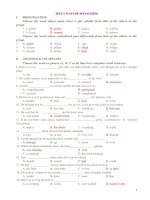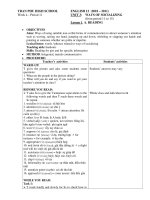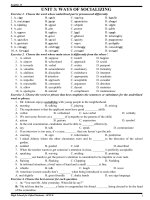- Trang chủ >>
- Văn Mẫu >>
- Văn Biểu Cảm
Unit 3 Ways of Socializing Language focus part 1
Bạn đang xem bản rút gọn của tài liệu. Xem và tải ngay bản đầy đủ của tài liệu tại đây (714.05 KB, 15 trang )
<span class='text_page_counter'>(1)</span>
<span class='text_page_counter'>(2)</span>
<span class='text_page_counter'>(3)</span> (Lời nói gián tiếp) 1. “ I am a student.” says Mai. => Mai says she is a student.. 2. “I am a student.” said Mai. => Mai said she was a student.. - Khi V dẫn ở thì Hiện tại thì thì của câu gián tiếp không đổi. - Khi V dẫn ở thì Quá khứ thì thì của câu gián tiếp lùi một thì so với câu trực tiếp.
<span class='text_page_counter'>(4)</span> 1. Changes in tenses (Thay đổi về thì) Direct speech. Reported speech. Hiện tại đơn: S + Vnt/ V-s/es. Quá khứ đơn: S + V-ed/ V2. Hiện tại tiếp diễn: S + is/ am/ are + V-ing. Quá khứ tiếp diễn: S + was/ were + V-ing. Hiện tại hoàn thành: S + have/has + V-ed/ V3. Quá khứ hoàn thành: S + had + V-ed/ V3. Quá khứ đơn: S + V-ed/ V2. Quá khứ hoàn thành: S + had + V-ed/ V3. Tương lai đơn: S + will + Vnt. Tương lai trong quá khứ: S+ would + Vnt. Is/ am/ are going to + Vnt. Was/ were going to + Vnt. Can/ may. Could/ might. Must/ Have to. Had to.
<span class='text_page_counter'>(5)</span> 2. Changes in S, O, Adj.P and P.Pronoun (Thay đổi về chủ ngữ, tân ngữ, tính từ sở hữu và đại từ sở hữu) Đại từ nhân xưng (S). I => he, she. You => I, we, he, she. We => they. Tân ngữ (O). Me => him, her You => me, us, him, her Us => them. Tính từ sở hữu (Adj.P). My => his, her. Your => my, our, his, her. Our => their. Đại từ sở hữu (P.Pr). Mine => his, hers. Yours => mine, ours, his, hers. Ours => theirs.
<span class='text_page_counter'>(6)</span> 3. Changes in time, place and demonstrative heads: (Thay đổi về từ chỉ thời gian, địa điểm và từ chỉ định) Direct speech. Reported speech. time. now today tonight tomorrow yesterday last night ago next day. then that day that night the next/ following day the day before/ the previous day the night before before the next day. place. here. there. demonstrativ e heads (Từ chỉ. this these. that those. định).
<span class='text_page_counter'>(7)</span> Chuyển đổi câu từ trực tiếp sang gián tiếp: 1. Statement: (Câu trần thuật) E.g.: ”I have just bought you a new hat,” my mother said to me. => My mother told me/said (that) she had just bought me a new hat.. S + told + O / said + (that) + S + V (lùi).
<span class='text_page_counter'>(8)</span> 2. Yes/No question: E.g.: ”Do you know her?” my friend asked me. => My friend asked me if I knew her. S + asked + O + if/whether + S + V(lùi) wanted to know.
<span class='text_page_counter'>(9)</span> 3. Wh - question: Ex:“What did you buy yesterday?” my mother asked my sister.. => My mother asked my sister What she had bought the day before.. S + asked/ wanted to know +(O)+ Wh-word…+ S + V(lùi).
<span class='text_page_counter'>(10)</span> Exercise 1:. “ I’m going to work in Ho Chi Minh City next next July July. .”. 1. Thuan said he was going to work in Ho Chi Minh City the. next July.
<span class='text_page_counter'>(11)</span> 2. I work for a big company. => Thuan said he worked for a big company. 3.I’m their marketing manager. => Thuan said he was their marketing manager. 4. The company has opened an office in Ho Chi Minh city. => Thuan said the company had opened an office in Ho Chi Minh city. 5. It has been very successful. => Thuan said it had been very successful 6. I have been chosen to run an office in District 5. => Thuan said he had been chosen to run an office in District 5. 7. How long have you been learning English? => Thuan asked me how long I had been learning English. 8. I don’t have much time to enjoy myself. => Thuan said he didn’t have much time to enjoy himself. 9. I hope you will come and visit me in Ho Chi Minh city. => Thuan hoped I would come and visit him in Ho Chi Minh city..
<span class='text_page_counter'>(12)</span> “I hope I will be successful in Ho Chi Minh City.. 9. Thuan hoped he would be successful in Ho Chi Minh City..
<span class='text_page_counter'>(13)</span> 1. Mary said : “My father died a year ago”. Mary said that ……………………………………… her father had died a year before 2. John said : “I have finished studying my lesson”. John said ……………………………………………. he had finished studying his lesson. 3. He asked me : “Why didn’t you come to class yesterday?” why I hadn’t come to class. He asked me ………………………………………. 4. “Did you phone me yesterday?” Tom asked Mary. Tom asked Mary …………………………………… if she had phoned him the day before..
<span class='text_page_counter'>(14)</span> - Learn by heart the content of the theory - Do exercises in the workbook.
<span class='text_page_counter'>(15)</span>
<span class='text_page_counter'>(16)</span>









